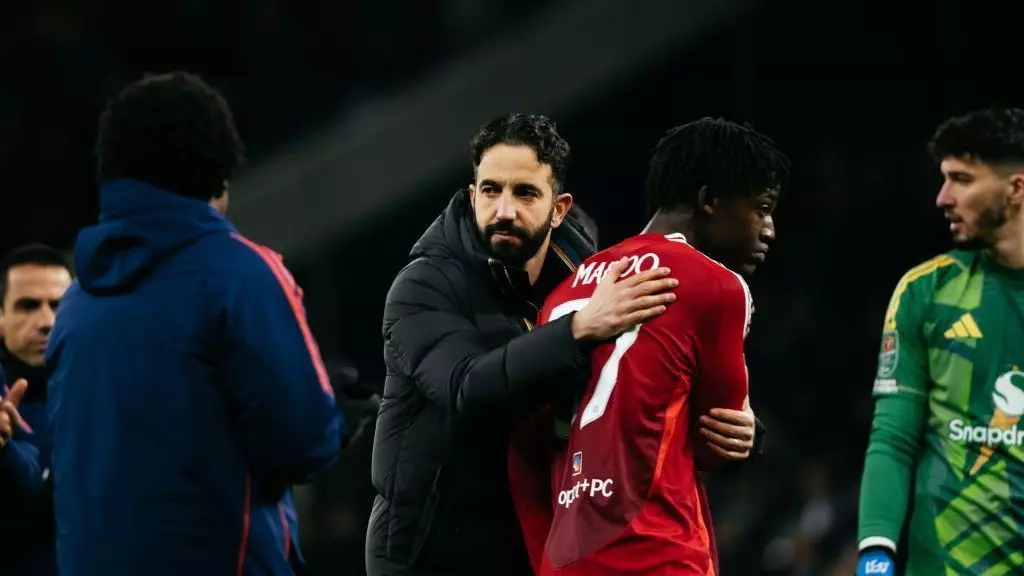In the world of professional football, the decisions made by head coaches can often become the focal point of intense scrutiny, particularly when stakes are high. Recent events surrounding Manchester United’s Carabao Cup quarterfinal against Tottenham Hotspur have brought this reality to the forefront. Head coach Ruben Amorim’s controversial decision to drop star player Marcus Rashford from the squad has ignited a firestorm of discussion among fans and analysts alike. The match ended in a gripping 4-3 defeat for United, raising questions about the tactical choices made and their implications for the team’s morale and future.
The decision to exclude Rashford marked the second consecutive match he missed, having also sat out the previous game against rivals Manchester City, which United won 2-1. Rashford, a key figure in the team’s attacking lineup, provided a stark contrast to the rest of the squad’s performance. The England international’s absence was felt both emotionally and statistically during the match against Tottenham. Despite a commendable comeback from 3-0 down to 3-2, the team ultimately succumbed to Spurs—a reflection of both Franco Forster’s blunders in goal and the shortcomings exposed without Rashford’s dynamic presence on the pitch.
Amorim defended his decision, insisting that every selection he makes prioritizes the team’s overall effectiveness and cohesion. He stated, “I feel that I do the right thing for the team so it’s never a mistake.” This steadfast belief suggests that Amorim values a broader strategy over individual performances. But such a decision can have broader ramifications, especially when players like Rashford publicly express their desire for an exit from the club.
What is particularly striking about Amorim’s responses to the match’s outcome is the way he analyzed the team’s dynamics. He maintained that the team performed better than the scoreline suggests, controlling possession for significant periods. Amorim lamented the “disconnect” experienced during an eight-minute stretch when Tottenham capitalized on United’s vulnerabilities, scoring two quick goals that ultimately shifted the momentum and outcome of the match. This period serves as a critical lesson for the coaching staff regarding the importance of maintaining focus and discipline throughout matches, as games can pivot dramatically in mere minutes.
The manner in which the team performed under pressure also provides insight into Amorim’s character and belief system. He conveyed a support of his players, praising their resilience in recovering from dire situations. However, it is essential to consider whether his approach will resonate positively throughout the squad or cause discontent among those who feel sidelined, such as Rashford and others hungry for game time.
One cannot overlook the critical impact of goalkeeping on the match and the wider implications for the team. In a position that demands unwavering confidence and composure, both United’s Altay Bayindir and Spurs’ Fraser Forster became the focal points of criticism due to their respective errors. Bayindir’s rare start, while justified in bringing fresh talent to the forefront, resulted in two costly mistakes. On the flip side, Forster’s blunders—particularly an embarrassing moment when he hesitated on a back pass—will only add to the ongoing debate about the team’s goalkeeping resources.
For Tottenham, manager Ange Postecoglou remained optimistic about Forster’s potential, recognizing the goalkeeper’s overall contributions to the team’s form prior to the match. Yet, the pressure is unmistakably on both shot-stoppers moving forward, as their performances reflect not just on themselves but significantly on the teams they represent.
Reflections on Future Matches
With Tottenham advancing to face Liverpool in the semifinal, the focus shifts toward how Manchester United will learn from this experience. Their exit from the Carabao Cup could serve as a catalyst for constructive change, prompting Amorim to reassess player roles, strategy, and, notably, how to manage team dynamics amid controversies.
The ripple effects of this match will undoubtedly echo in future encounters, challenging Amorim’s tactical acumen and decision-making abilities. Fans and pundits alike will be watching closely, eager to see if he can navigate the turbulent waters of team management while re-engaging a once-stellar talent like Rashford. In the high-stakes arena of football, adaptability is as crucial as talent, and how Amorim responds will define not only his tenure but possibly the trajectory of Manchester United in the season ahead.

